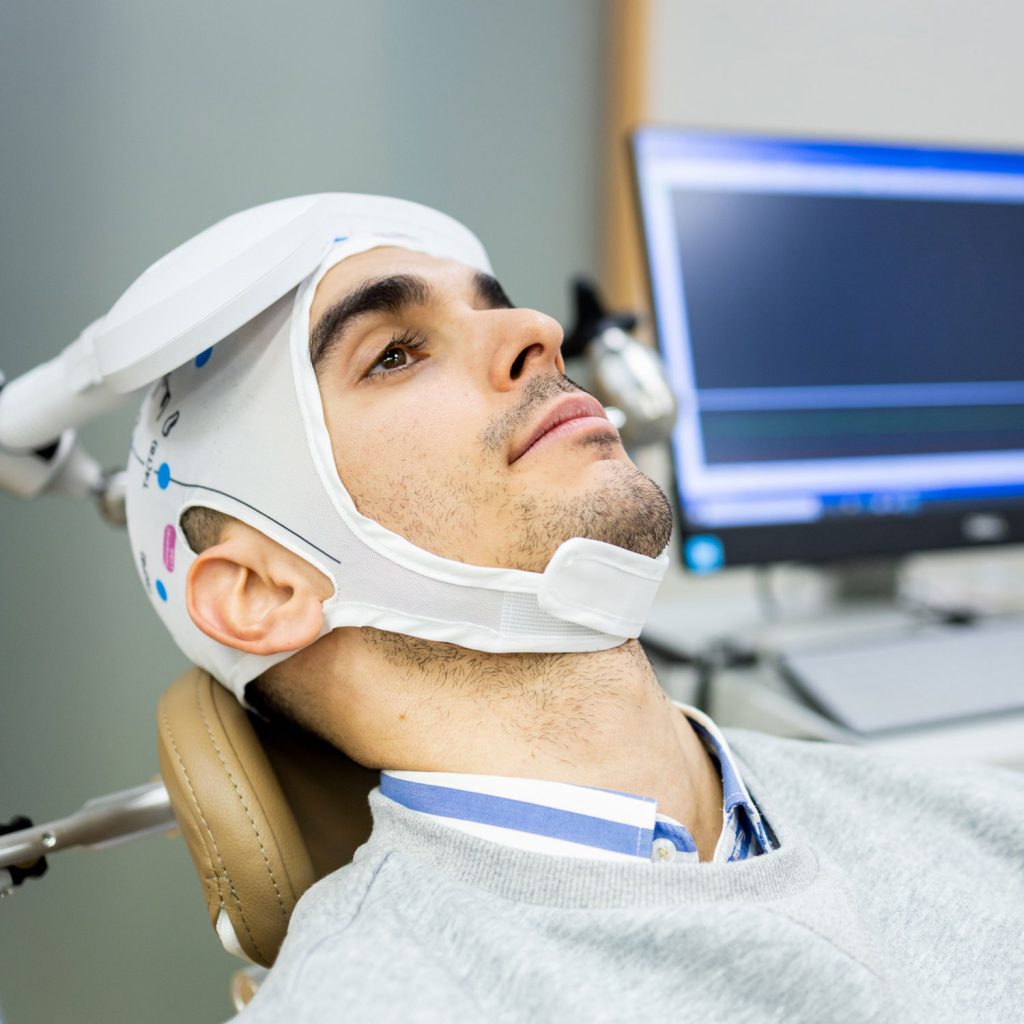
Outpatient Day Programs
Repetitive Transcranial Magnetic Stimulation (rTMS)
Overview of rTMS
rTMS is a modern treatment that uses a specially designed medical device to deliver repetitive magnetic pulses to specific regions of the brain. These pulses gently activate nerve cells, helping to improve communication between brain regions involved in mood and emotional regulation.
1
Non-invasive – no surgery or anaesthesia is required.
2
Painless – most people experience only a tapping sensation on the scalp during treatment.
3
Medication-free – suitable for individuals who have not benefited from, or cannot tolerate, antidepressant medications.
4
Convenient – sessions are conducted on an outpatient basis, with patients able to return to normal activities immediately afterwards.
A typical course of treatment involves multiple sessions over several weeks. Each session lasts around 20–40 minutes, depending on the protocol recommended by the treating psychiatrist.
Conditions treated with rTMS
Major Depressive Disorder (MDD)
Bipolar Depression
Anxiety Disorders
Post-Traumatic Stress Disorder (PTSD)
Obsessive-Compulsive Disorder (OCD)
Older Adults with Stable Cognition
Evidence for rTMS
rTMS is supported by an expanding body of international and Australian research demonstrating its safety and effectiveness.
Depression
Anxiety & PTSD
Obsessive-Compulsive Disorder (OCD)
Safety
rTMS is well tolerated, with the most common side-effects being mild scalp discomfort or headache, which usually resolve quickly. Unlike medications, rTMS does not cause systemic side-effects such as weight gain, drowsiness, or sexual dysfunction.
In Australia, rTMS is increasingly offered in both public and private hospitals. Medicare currently provides rebates for rTMS in treatment-resistant depression, making it a more accessible option for patients.
How rTMS is delivered at Sunshine Clinic
At Sunshine Clinic Private Hospital, rTMS is provided under the supervision of consultant psychiatrists and trained staff. Our program includes:
- Comprehensive assessment – ensuring rTMS is appropriate and safe for each patient.
- Personalised treatment plans – tailored to individual needs and conditions.
- Outpatient sessions – allowing patients to attend regularly while continuing daily routines.
- Integration with therapy – combining rTMS with psychological therapies such as CBT, ACT, or mindfulness to maximise outcomes.
- Monitoring and review – regular follow-up with psychiatrists to track progress and adjust treatment if necessary.
Both inpatients and outpatients can access rTMS, making it a flexible option that can be incorporated into short-term stabilisation or longer-term recovery programs.
Why rTMS is Valuable for Recovery
For patients and families who have tried multiple treatments without success, rTMS can provide new hope. Patients often report:
- Significant improvement in mood and daily functioning.
- Reduced reliance on medication or improved effectiveness of existing treatments.
- Relief from distressing symptoms without the burden of side-effects.
- Renewed confidence and energy to re-engage in work, relationships, and meaningful activities.
At Sunshine Clinic Private Hospital, rTMS is more than a medical procedure – it is part of a holistic, recovery-oriented approach that places patients at the centre of care. By offering advanced treatments alongside compassionate support, we help individuals move beyond treatment resistance and towards lasting wellbeing.
Comprehensive Private Mental Health Care in Melbourne’s West
Sunshine Clinic offers psychiatry consulting services, as well as inpatient and outpatient programs tailored to support recovery, resilience, and long-term wellbeing.